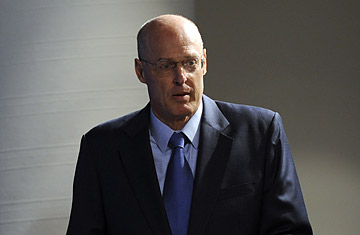
Treasury Secretary Henry Paulson, Jr..
It's been a turbulent few weeks for U.S. Secretary of the Treasury Henry Paulson, Jr. As a principal architect of America's economic policy, Paulson (known as Hank) helped orchestrate the Sept. 7 government takeover of mortgage institutions Fannie Mae and Freddie Mac and the $85 billion bailout of insurance giant American International Group (AIG) on Sept. 16. By the close of business two days later, he was reportedly looking to find a long-term solution to the nation's ongoing credit crisis, buoying markets on rumors that the Treasury would create some sort of government agency to absorb banks' bad debts.
Paulson was nominated by President George W. Bush to assume the secretary's post in 2006 and unanimously confirmed by the U.S. Senate, replacing John Snow. Previously he had served as Chairman and CEO of investment banking giant Goldman Sachs from 1999 to 2006, during which he led the firm through a period of whopping growth. He embraced risk, taking on debt and betting big when the odds dictated it. Now he is charged with cleaning up the sizable mess left by an epidemic of risk-taking run amok.
Paulson was raised in Barrington, Ill., outside Chicago, where he developed an abiding interest in wildlife and the environment. (He was later Chairman of the Board of the Nature Conservancy.) He went to college at Dartmouth, where earned the nickname "The Hammer" as a member of the school's football team. After graduating Phi Beta Kappa in 1968, he earned an MBA at Harvard before embarking on stints in the Department of Defense and as a White House aide under Richard Nixon.
Disillusioned by the administration's corruption, Paulson joined Goldman's Chicago office in 1974. His rise in the investment bank was meteoric (he made vice president within four years), and in 1998 he became co-CEO alongside current New Jersey Governor Jon Corzine. Paulson presided over the firm's immensely profitable IPO in 1999 — an offering to which he had long objected — and reaped the dividends immediately. Overnight, his holdings in Goldman rocketed from $95 million to $315 million. Though his ascent to Treasury Secretary in 2006 was by all accounts a promotion, it was nonetheless a sharp blow to his wallet. The secretary position pays $191,300; in the year before he left Goldman, Paulson netted almost $40 million.
